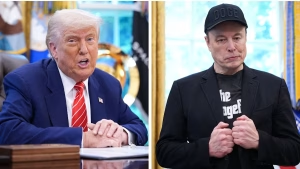Late on June 6, the Supreme Court gave the Department of Government Efficiency (DOGE) two significant victories in its fight to shrink the federal government.
The two unsigned decisions were simultaneously issued by the country’s top court.
A lower court ruling prohibiting DOGE employees from accessing private information at the Social Security Administration (SSA) is lifted in the first order.
In a pending litigation, the second order formally bans orders from lower courts that require DOGE to reply to petitions for freedom of information.
Executive Order 14158, which was signed by President Donald Trump on January 20, renamed the United States Digital Service as the United States DOGE Service and established an advisory group to provide cost-cutting strategies for federal agencies.
“Implement the President’s DOGE Agenda, by modernizing Federal technology and software to maximize governmental efficiency and productivity,” was the executive order’s directive.
In issuing a temporary restraining order against the federal government, the judge said, “The DOGE Team is essentially engaged in a fishing expedition at SSA, in search of a fraud epidemic, based on little more than suspicion.”
Hollander gave DOGE instructions to remove whatever personally identifiable information it had. The temporary restraining order was modified to a preliminary injunction by Hollander on April 17.
The U.S. Court of Appeals for the Fourth Circuit decided 9–6 on April 30 to uphold Hollander’s order until the outcome of the appeal.
The Supreme Court determined that “under the present circumstances, SSA may proceed to afford members of the SSA DOGE Team access to the agency records in question in order for those members to do their work,” stating that the conditions for a stay of Hollander’s preliminary injunction had been satisfied.

Justices Ketanji Brown Jackson, Elena Kagan, and Sonia Sotomayor dissented.
Kagan declared that the emergency application will be rejected. She didn’t explain why she cast her ballot.
Sotomayor concurred with the dissenting opinion Jackson gave.
According to Jackson, the Social Security Administration is being given permission by the Supreme Court “to hand DOGE staffers the highly sensitive data of millions of Americans.”
Because the court “dons its emergency-responder gear, rushes to the scene, and uses its equitable power to fan the flames rather than extinguish them,” the justice observed, the court is moving excessively quickly in this case.
When a strict interpretation of the law might lead to injustice, courts employ their equitable powers to ensure fair outcomes.
Following Chief Justice John Roberts’ May 23 administrative stay temporarily halting lower court rulings permitting discovery, the second order was issued in U.S. DOGE Service v. Citizens for Responsibility and Ethics in Washington (CREW).
Depositions and other techniques are used to collect evidence during the discovery phase.
In a brief it filed, CREW argued against the government’s emergency move to stop discovery, claiming that DOGE is exercising “substantial independent authority,” essentially making it an agency subject to the Federal Records Act and the Freedom of Information Act (FOIA).
Subject to some restrictions, people are permitted “to obtain access to government information in executive branch agency records” under the Freedom of Information Act, which went into effect in 1966.

On a government website, it states that “FOIA applies to records created by federal agencies and does not cover records held by Congress, the courts, or state and local government agencies.”
In April, an order granting discovery in the case was issued by the U.S. District Court for the District of Columbia. The court issued a scheduling order for discovery in May.
The district court’s April discovery order, which required the government to reveal “Intra-Executive Branch USDS recommendations and whether those recommendations were followed,” was deemed by the high court to have been overly expansive.
The Supreme Court ruled that “any investigation into whether an entity is an agency for the purposes of the Freedom of Information Act cannot turn on the entity’s ability to persuade.”
Furthermore, the high court stated that the judiciary must yield to the Executive Branch in regards to the possibility of internal government communications being revealed during the discovery process, as required under the theory of separation of powers.
According to a constitutional principle known as the separation of powers, the government is divided into three branches in order to prevent any one of them from gaining excessive power.
Source: The Epoch Times











